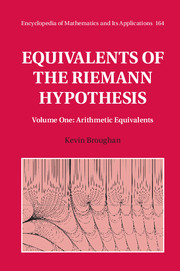Book contents
- Frontmatter
- Dedication
- Epigraph
- Contents
- Contents for Volume Two
- List of Illustrations
- List of Tables
- Preface for Volume One
- List of Acknowledgements
- 1 Introduction
- 2 The Riemann Zeta Function
- 3 Estimates
- 4 Classical Equivalences
- 5 Euler's Totient Function
- 6 A Variety of Abundant Numbers
- 7 Robin's Theorem
- 8 Numbers That Do Not Satisfy Robin's Inequality
- 9 Left, Right and Extremely Abundant Numbers
- 10 Other Equivalents to the Riemann Hypothesis
- Appendix A Tables
- Appendix B RHpack Mini-Manual
- References
- Index
7 - Robin's Theorem
Published online by Cambridge University Press: 27 October 2017
- Frontmatter
- Dedication
- Epigraph
- Contents
- Contents for Volume Two
- List of Illustrations
- List of Tables
- Preface for Volume One
- List of Acknowledgements
- 1 Introduction
- 2 The Riemann Zeta Function
- 3 Estimates
- 4 Classical Equivalences
- 5 Euler's Totient Function
- 6 A Variety of Abundant Numbers
- 7 Robin's Theorem
- 8 Numbers That Do Not Satisfy Robin's Inequality
- 9 Left, Right and Extremely Abundant Numbers
- 10 Other Equivalents to the Riemann Hypothesis
- Appendix A Tables
- Appendix B RHpack Mini-Manual
- References
- Index
Summary
Introduction
This chapter has as its focus Robin's theorem, an explicit inequality involving the sum-of-divisors function, valid on an explicit range, its validity being equivalent to RH. It forms part of what we call the Ramanujan–Robincriterion. We include Ramanujan because this great Indian mathematician first demonstrated the truth of the inequality assuming RH, albeit the asymptotic form.
The life of Srinivasa Ramanujan (pronounced Ra-manu-jan) requires no introduction, since it has been celebrated in books, plays and film. His vast mathematical contributions have been treated in depth in the monumental works of Bruce Berndt, including [10].
Guy Robin was supervised by Jean-Louis Nicolas (the Nicolas of Chapter 5) at the Université de Limoges, and received his Ph.D. in 1983 with a thesis entitled “Grandes valeurs de fonctions arithmétiques et probl`emes d'optimisation en nombres entiers”. One of his students, Pierre Dusart, is making important contributions to the ongoing development of this approach to RH. According to [128], Robin did not learn of Ramanujan's unpublished result, showing Robin's inequality was necessary if RH was true, until several years after he had discovered his theorem and proof.
We have already seen some introductory and historical information regarding σ(n) in Chapter 6. It should come as no surprise that, because of the close relationships between the sum-of-divisors function and Euler's totient function ϕ(n), and the equivalences to RH developed in Chapter 5, there are equivalences to RH which can be expressed in terms of σ(n).
Paul Erdös was interested in common properties of σ(n) and ϕ(n) throughout his career, and authored or co-authored many papers exploring this connection. For example Alaoglu and Erdös [3] state that both σ(n) and ϕ(n), for every e > 0, apart from a set of density zero, are divisible by every prime less than (loglogn)1−e and by “relatively few” primes larger than (loglogn)1+e.
Aside from being multinomials in the prime factors of n, and obeying the inequality σ(n)/n ≤ n/ϕ(n), at first glance these functions have very little in common. Their definitions and genesis are completely different. Nevertheless, properties of one function are frequently mirrored by the properties of the other one.
- Type
- Chapter
- Information
- Equivalents of the Riemann Hypothesis , pp. 165 - 199Publisher: Cambridge University PressPrint publication year: 2017



